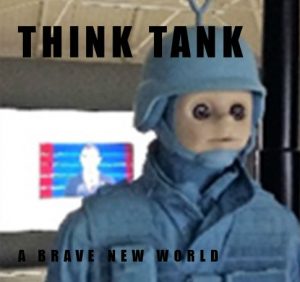Association News
Think Tank: Robotic CEO?
February 23, 2017 - Association News
 OK, so if Artificial Intelligence is to replace them, what are the qualities of an association CEO? What does an association CEO actually do? Good question! A combination of politician, ambassador, tactician, and showman you might say. And a small business leader to boot! OK, but what qualities does a good CEO need to succeed? That’s a question that involves a long answer and one which will be unique to each trade or professional association. The Institute of Association Management has produced a list of the 13 key attributes of association management CEOs which is handy for ticking off the bullet points on a job description. But I believe a great CEO has both emotional and analytical skills. And don’t forget the physical aspects of the job too!
OK, so if Artificial Intelligence is to replace them, what are the qualities of an association CEO? What does an association CEO actually do? Good question! A combination of politician, ambassador, tactician, and showman you might say. And a small business leader to boot! OK, but what qualities does a good CEO need to succeed? That’s a question that involves a long answer and one which will be unique to each trade or professional association. The Institute of Association Management has produced a list of the 13 key attributes of association management CEOs which is handy for ticking off the bullet points on a job description. But I believe a great CEO has both emotional and analytical skills. And don’t forget the physical aspects of the job too!
The very essence of any membership organisation is communication. Be it oral, written, or via social media, the CEO – especially in a small organisation – is generally the communicator in chief. Engaging, communicating, empathising, should be in their DNA. But don’t mistake this for broadcasting! Communication is a two-way street, with ideas flowing in and out. Thought leader you may be, dictator you are not! Sometimes you’re an agony aunt listening, analysing, and resolving professional and personal issues with board members, officers and staff. And only occasionally will you get to unleash you inner Henry V!
Politician, ambassador, and diplomat are also within the remit of the successful CEO. The ‘conduct of relations between nations by peaceful means’ is how the dictionary puts it. But the ability to communicate and negotiate at all levels with people from different backgrounds and organisations and cultures is probably closer to the mark. So, it goes without saying that you must be a people person, able to connect, and be approachable.
A lot of hot air is expended on the subject of leadership. Quite whether leaders are bred or nurtured isn’t clear. But whichever it is, you won’t go far as an association CEO without this quality. Motivating and managing Boards, volunteers, officers, staff, and members, is an uphill battle unless you have natural leadership qualities. Brushing up your skills can’t hurt, but personally I don’t put much faith in self-help books, mantras, and seven point plans. Leadership is a complex formula that mixes head and heart in different quantities according to the situation. Ticking boxes just isn’t enough!
Entrepreneurship is frequently required to devise and exploit money-making schemes. Unless you are very fortunate there is generally a gap between the income from membership subscriptions and out-goings. In most cases it will be down to you to fill it, and this is where your innate business acumen comes in. The business person in you will always be switched on. Identifying, developing and implementing events, training, publications, sponsorship, and other income generators.
To quote George Orwell’s “Who controls the past controls the future; who controls the present controls the past” or, Winston Churchill’s, “History will be kind to me for I intend to write it”, in the same sentence may be to stretch an analogy to breaking point. But it neatly illustrates what politicians and historians have always known; that control of the written record confers power on the author. So, in the association context, the person who signs off the Minutes, or writes the business-plans, reports, and memoranda, wields considerable authority. If they in turn translate the decisions of the Board and sub-committees into actions, they influence the speed and direction of travel. And if they can also write meaningful articles they control the narrative that influences internal and external observers.
So, armed with the skills of a planner, guiding strategic direction of the association and developing appropriate plans; a project manager, planning, directing and implementing major projects and events; and a lawyer, familiar with company and/or charity law and appropriate regulations, you will be almost fully equipped. But not quite. Because the ability to understand budgeting, accounts and reporting, and have a firm grasp on governance are also essentials in the CEO’s tool kit.
Finally, and not to be underestimated, are the physical and mental resilience needed to withstand a punishing schedule. A thick skin, the capacity to act alone, and brush off occasional assaults on your reasoning, integrity, and goodwill are a must! And a robust constitution is a blessing! Early mornings, late nights, travel – in the UK and abroad – all take a physical toll. As do the demands of ‘socialising’, which may involve excess eating – and other temptations – and maybe even loss of sleep! Add that to the need to always be well turned out, bright-eyed and receptive, and you’ve cracked it!
Michael Hoare
©2017 M J Hoare


